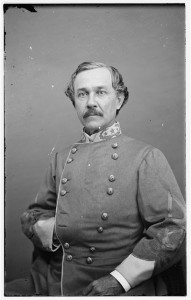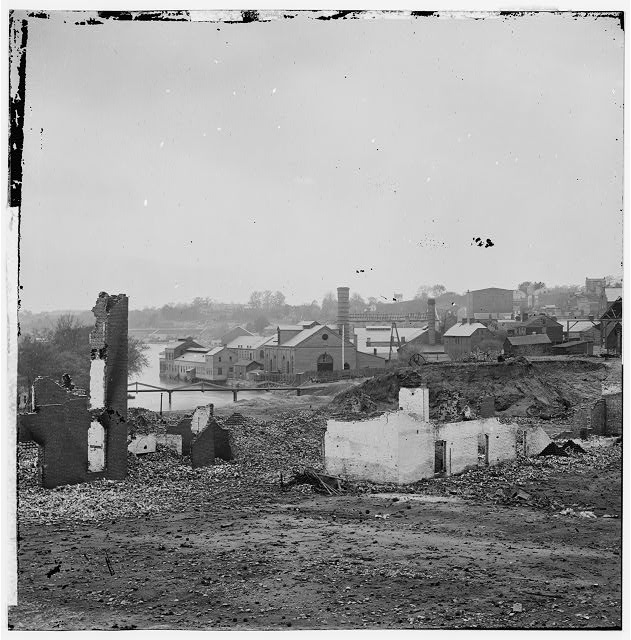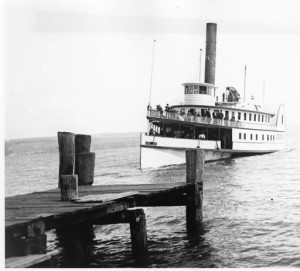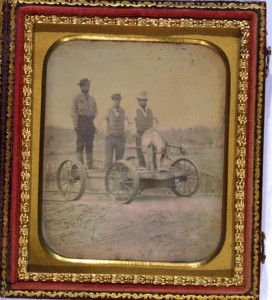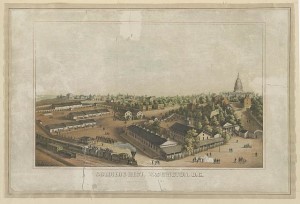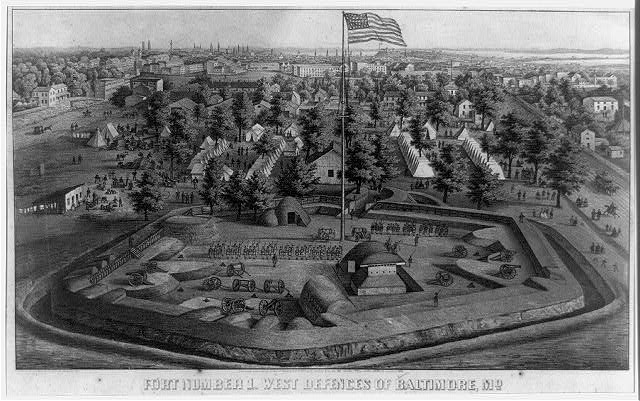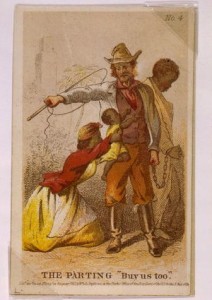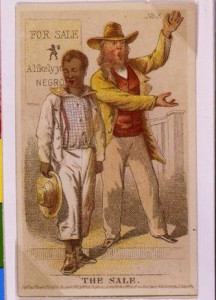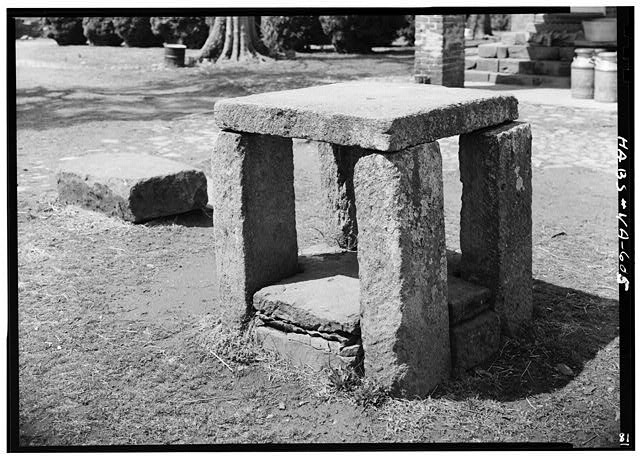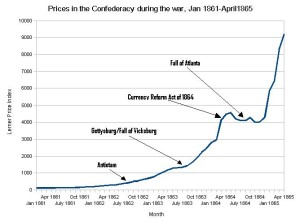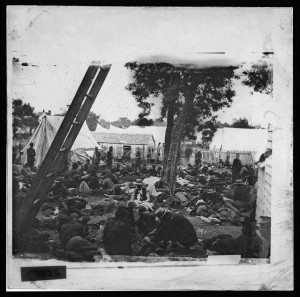A New York paper says it is republishing an article from a Richmond newspaper, no date given, that comments on worsening conditions in the Confederacy. How do you house and feed three million people in the Southern capital? The writer presented a detailed plan, but eventually cannibalism will result in a society consisting only of Government and Negroes. Here are some excerpts.
From The New-York Times October 25, 1863:
PROSPECTIVE TROUBLE IN THE CONFEDERCY.; PROPOSITION TO MEET IT VERY HUMOROUS AND VERY JOLLY.
A writer in the Richmond Examiner proposes a plan for stowing the population of the entire Confederacy in Richmond, and supplying them with food. He details the plan at great length, making it a cover for satire upon the civil and military management, and the social condition of the Confederates.
To cram the entire population of the South into a single city seems, at first sight, an impossibility, and the persistent attempt now being made to perform it is enough to fill the heart of the most tranquil and well provided speculator with alarm, to say nothing of the certainty of its being attended with fatal consequences. Nevertheless, it is quite plain that the whole Confederacy must be thrust into this city at no distant day, and it is necessary at once to provide lodging and food — raiment is out of the question — for this inevitable addition to our population. By the masterly tactics of Gens. Pemberton and Bragg our lines have been rapidly contracted and the necessity of defending an immense frontier obviated. I have it from the Adjutant-General’s Department that this contraction will continue until the area of defence is confined in the compact and powerful triangle bounded by Lynchburgh, Petersburgh, and Richmond. As a matter of course, the citizens of the other States of the Confederacy will repair to Virginia, and chiefly to Richmond, for protection, and I am happy to say that the Commissary-General is bending his great energies to the task of sustaining them. But accomplished as he is, he will hardly be able to feed, much less shelter them; that task must devolve upon the hospitable citizens of Richmond, who, I doubt not, will address themselves promptly to the work without any grumbling.
I have made a careful estimate of the probable number of refugees who will be concentrated here before the 1st of January next, and find that the population of Richmond at that time (due allowance being made for those in the overrun States who will take the oath or cannot leave their properly until it is regularly confiscated) will be a fraction over three million souls, including males, females, children and negroes. Now, the total available house-space of Richmond, as I have ascertained by actual measurement, is 9,785,000 cubic feet — say, in round numbers, ten million cubic feet. Allowing four cubic feet to each individual, it will be seen little more than half the prospective population of Richmond can be accommodated with house room, even we pack them like shad, had [and?] make a reasonable deduction for deaths by suffocation.
As early as the middle of November the negro population of Richmond will be about 643,000 of all ages. As our ports will be closed, and all our cotton manufactories will be in the hands of the enemy, it will be impossible to clothe our white population, except by depriving the blacks of whatever apparel they may chance to have. All negroes must go naked, that is quite clear. During the daytime they can easily be kept warm by hard work, but at night they must be lodged; and to this end I respectfully suggest the construction of the requisite number of catacombs in Church Hill and the bluff under Chimborazo Hospital. Delicate house servants and favorite chambermaids may be accommodated for the night in the unoccupied vaults at Hollywood. Negro infants and children, too young to work, must be left during the day in the catacombs, with suitable attendants to daub the holes partly up to prevent them from falling out, and to limit the amount of dirt they eat — that of Church Hill being unusually palatable and fattening — so much so, indeed, that no other food will be required there, and the only difficulty in that way will be the prevention of indigestion from eating too much of it.
The negro being disposed of, I come to the prospective citizens, namely, gamblers and courtezans. …
To the sole objection that these people on Belle Isle will find it difficult, if not impossible, to keep from perishing by cold and starvation, I reply that their ordinary avocations are exciting enough to keep their blood at the proper temperature, and, if this be not enough, a still more rapid flow of the circulation may be obtained by making them devote their afternoons to their usual pleasantry of fighting with revolvers and bowie-knives. An inconsiderable number of them, say fifty or sixty a day, will probably be killed; but as this will only add zest to their amusement and increase the chances of making money for those who remain alive, I do not see that the Christian philanthropist or the undertaker (provided their carcasses are not thrown into the river) can make any just complaint of a practice so invigorating and fuel-economizing. By establishing hospitals for the very large number of desperately wounded, we shall be able to furnish occupation to the hundreds of Confederate Surgeons who have nothing to do during the non-[f]ighting months of Winter, except to play cards and entertain their female friends at sumptuous night suppers. In this way a great deal of the public money will be saved and the cause of science largely benefitted by the variety of excrutiating surgical experiments made upon the patients, whose deaths can never be so beneficial as when they are tortured out of existence in the interests of pathology and Southern finance.
The negro and the gambler being disposed of, we approach naturally enough the Jews, a class which includes not only the unworthy Israelites, but all who indulge the alleged Hebraic propensity for exacting the pound of Christian flesh and amassing riches at the expense of the life-blood of their fellow-citizens. Such are Yankee tradesmen of whatever denomination, restaurant keepers, confectionery and apple sellers, oyster-cellar men, proprietors of hotels and boarding-houses, and the like. All these come under the same head, and are to be disposed of in the same manner. I estimate their present and prospective numbers at 500,000. They occupy now a great deal of house-room; hereafter they will occupy much more; and hence the imperative duty of expelling them and appropriating their establishments to some useful purpose.
I am told that the Jews, in addition to the shop in which they are now reduced to the unprofitable business of selling lead pencils at a dollar apiece, meerschaum pipes made out of plaster of Paris, empty pocket-books, and rotten shoe-strings, at similar rates, own a vast number of the best houses in the city, purchased by their honest gains, and now filled with flour, bacon, sugar, salt, coffee, tea, corn, meat, oats, hay, fodder, shucks and other necessaries of life. If this be true, not a moment is to be lost in ousting them, in order to save the army and the people from starvation. They are said to have packed away in their cellars and garrets enough clothing, made and unmade, to furnish every respectable man, woman and child in the Confederacy with two complete Winter suits, besides whisky, brandy and wine enough to keep the taro-banks, cannal-pockets, Congress and Gov. LETCHER supplied for nearly three months to come. These must be obtained without delay or regard to law or peril to [???]e or limb. …
We have now successfully housed three millions of people. They must be fed, or they will die. Can this be done? With the utmost ease, if my advice be followed, as I doubt not it will. The negroes need not be taken into the account, for they will live on edible dirt, and if they want more food they can easily steal it. The gentlemen from Maryland, &c., who live in houses, will necessarily have a monopoly of all meats, vegetables, fruits, bread — whether made of corn-meal or flour — at Government prices, and whatever else they may desire, except bran, which will be reserved for a particular purpose. This will leave some two millions and a half of hungry mouths to be fed, and here arises the difficulty, which I flatter myself I have overcome more readily and pleasantly, perhaps, than any other person in the Confederacy could have done. It has been suggested to me by the learned and original author of “Cannibals All,” that the common repugnance to human food is but a foolish prejudice, born of modern philosophy and political economy, and that the best course for me to pursue if I am, in accordance with an act of Congress, appointed Commissary-General, as I expect to be, will be to disregard the weak vagaries of philanthropists and vegetarians and proceed at once to feed the people copiously with the most accessible animal diet, which will, of course, be human flesh. He urges that the gamblers and the harlots take it turn about to eat each other, that the Jews confined in the mills be fed on restaurant keepers, &c., that the Jews be then thrown to the poor people who live in hogsheads and barrels, who will gladly eat them, and, in their turn, will be devoured by the negroes; so that the dangerous classes will be destroyed at a blow, and nobody be left but government and negroes, and the Sociology of the South established on the only firm basis possible — a basis which the slow cannibalism of modern antagonism between labor and capital would hardly reach in a century.

